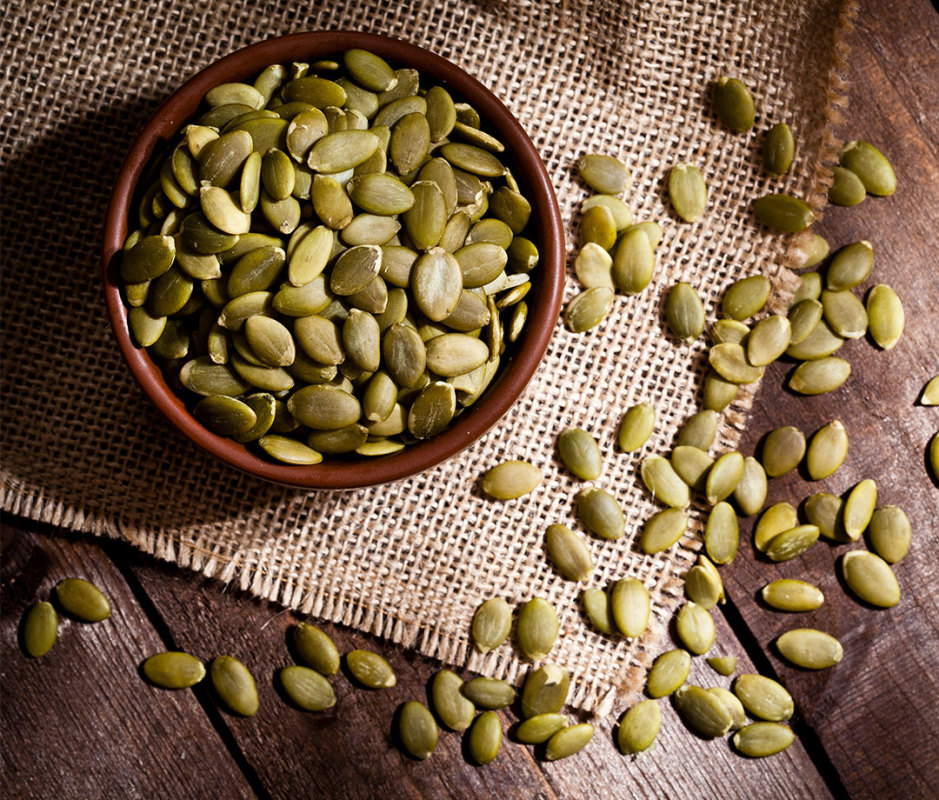What Are the Benefits of Magnesium for Men?
[ad_1]
Magnesium. You’re no doubt familiar with the mineral. But to name magnesium benefits and what it does in the human body? That might stump you. Not to worry, we’ve drawn up a primer on what is magnesium, benefits of a magnesium supplement, foods with magnesium, and more.
By the end of this, you’ll know why men should regularly consume magnesium in their diet through supplements and food. Contrary to what you might think, there are a variety of foods with magnesium, so supplementation isn’t always necessary and it’s easy to avoid a magnesium deficiency.
Note: Speak to a doctor or dietitian about supplements before taking anything new.
What Is Magnesium?
“Magnesium is an essential mineral and is crucial for many different functions in the body, such as playing a pivotal role in more than 300 enzymatic reactions, along with energy production, muscle and nerve function, and protein synthesis,” says registered dietitian Trista Best, MPH, RD, LD.
Best notes it’s particularly important for men to consume magnesium daily and meet their intake needs to receive magnesium benefits. These benefits substantially impact and improve health and wellness for men, including decreased risk of disease (such as age-related disease); supporting muscles and bones for workouts, performance, and recovery; and keeping the mind and body agile, strong, and sharp.
Is Magnesium Good for Men?
There are many magnesium benefits for men, especially active men, since magnesium supports and improves muscle function and contraction, energy production, and cardiovascular health.

Getty Images
Magnesium Benefits
1. Maintains Healthy Fluid and Electrolyte Balance
Similar to potassium, magnesium is an electrolyte, a type of mineral that helps your body regulate chemical reactions and maintains the balance of fluids in the body. Therefore, it’s critical to maintain adequate levels of magnesium during the day and replenish depleted stores when needed.
“Magnesium impacts muscle and cellular health, various metabolic functions and processes, and is particularly significant for its involvement in muscle contractions, energy metabolism, and maintaining electrolyte balance,” Best explains.
Magnesium also helps prevent injuries and dehydration—which are of particular concern to men during exercise, especially when it comes to long or intense workouts. Since sweat production contributes to greater loss of fluids and nutrients, a beverage with magnesium will make workouts more effective, safe, and powerful. You could even try a magnesium-rich pre-workout snack (like almonds or cashews) or mix a magnesium supplement with water.
2. Promotes Cardiovascular Health and Circulation
“Magnesium supports cardiovascular health by helping to maintain a normal heart rhythm and healthy and proper electrolyte balance, which are crucial for efficient blood flow and circulation,” Best says.
A healthy cardiovascular system is vital for disease prevention, movement, and well-being, and also improves endurance, mobility, strength, and stamina. A 2018 meta-analysis published in Nutrients that included about 637,922 individuals found that high magnesium intake lowered risk of cardiovascular disease and its risk factors: hypertension, diabetes, metabolic syndrome, and stroke.
3. Boosts Workout Performance and Supports Muscles
“Magnesium plays a crucial role in muscle contractions and relaxation, aiding in efficient movement and reducing the risk of cramps,” Best says. Higher magnesium intake improves balance and stability, control and coordination, and agility and comfort. The electrolyte also prevents muscle strains and injuries, which can occur due to poor recovery and muscle health.
4. Protects Bone Health and Density
Bone density naturally decreases with age, thus heightening risk of osteoporosis and breaks from slips, falls, or accidents, since the body’s more fragile. Magnesium increases absorption of calcium, Best notes, so pair foods with magnesium, such as nuts and seeds, with a source of calcium, like a glass of milk, to maximize absorption and benefits. Higher magnesium intake is associated with higher hip and femoral neck bone mineral density in older adults, according to a 2022 meta-analysis, published in Bone, comprising six cohort studies, one case-control study, and five cross-sectional studies.
5. Regulates Energy Production and Metabolism
“Adequate magnesium intake can contribute to better endurance, strength, and recovery, which makes it advantageous for men who regularly exercise or engage in sports,” Best says. Magnesium converts carbohydrates and fats into usable energy sources, which allows the body to train harder, faster, longer and, well, better. This also helps replenish fluid and nutrient supply to prevent onset of fatigue and cramping, and any other potential dehydration symptoms.

Iuliia Pilipeichenko/Getty Images
How Much Magnesium Should I Take?
“The recommended dietary allowance (RDA) for magnesium is around 400 to 420 mg per day for adult males,” Best says. Though it may be slightly higher for active individuals, especially those engaged in regular exercise due to increased magnesium loss through sweat and urine. The RDA for magnesium for adult males is based on an average intake to meet the needs of majority of the population, according to the National Institutes of Health (NIH).
Is It Good to Take Magnesium Every Day?
Yes, it’s good for men to take magnesium daily for muscle function, energy production and performance to support an active lifestyle. “Consistent daily intake can help maintain optimal levels, support muscle recovery, reduce the risk of cramps, and provide sustained energy for workouts and daily activities,” Best says.
Eating enough foods with magnesium might be sufficient for daily intake, but if you can’t meet your needs, consider supplementing and speaking about it with your doctor or dietitian.
If you’re looking for magnesium to boost athletic performance, a 2015 randomized, double-blind, cross-over design study, published in the Journal of the International Society of Sports Nutrition, found there was no apparent benefit in long-term magnesium supplementation for athletes who have adequate dietary intake, but there are some benefits in taking an acute dose before intense exercise.
Foods With Magnesium
When planning daily meals and snacks, include a variety of magnesium-rich foods. Here are a few top sources.

fcafotodigital/Getty Images
- Serving size: 1 oz
- Magnesium: 168 mg
Just one serving of pumpkin seeds get you 40 percent of your daily recommended value of magnesium. They’re also high in antioxidants, iron, and zinc. Roast them and add to granola, yogurt, salads, or eat plain.

KarpenkovDenis/Getty Images
- Serving size: 100 g
- Magnesium: 121 mg
Kelp, or seaweed, is a good source of magnesium and other nutrients, such as iodine for thyroid function. Include in your post-workout snack or meal by enjoying it in a poke bowl with grains or greens, added vegetables, and a protein source like tofu, salmon, or tempeh.

Getty Images
- Serving size 1 oz
- Magnesium: 80 mg
Aside from packing magnesium, almonds offer up more fiber than any other nut. Enjoy the dry roasted variety.

Kativ/Getty Images
- Serving Size: ½ cup
- Magnesium: 78 mg
Boiled spinach may not scream exciting, but it’s incredibly versatile in any number of savory dishes. You can also sauté it with a little olive oil, minced garlic, and a sprinkling of red pepper flakes for about 30 seconds to enjoy as a side dish.

Priscila Zambotto/Getty Images
- Serving size: 1 oz
- Magnesium: 74 mg
Grabbing a handful of cashews is a great way to curb your hunger in the afternoon. You can also get your fill by having some cashew butter on whole-grain toast as a pre-workout snack.

Fudio/Getty Images
- Serving size: 1 cup
- Magnesium: 71 mg
This unassuming legume is a magnesium powerhouse. Choose lentil soup off the menu or cook up a can as an easy, filling lunch. (Just look for the low-sodium kind.)

ezza116/Getty Images
- Serving Size: 2 large biscuits
- Magnesium: 61 mg
Aside from the magnesium, shredded wheat (and bran) cereal provides a nice boost of energy—plus all that fiber will keep your digestive system running smoothly. To make it more interesting, add your favorite fruit. Bonus: Use soymilk, plain or vanilla, to the bowl. One cup also has 61 mg magnesium.

Fudio/Getty Images
- Serving Size ½ cup
- Magnesium: 50 mg
Order those little green pods as an appetizer next time you get sushi—not only do they pack some serious magnesium, but they’re a good source of protein, too. You can also add them into a quick weeknight chicken and broccoli stir-fry. (Most grocery stores sell them frozen and de-shelled.)
Types of Magnesium Supplements
Several types of magnesium supplements exist, each with pros and cons. The benefits of a magnesium supplement depend on the type, and the right one is dependent upon an individual’s personal needs, preferences, and tolerances. A doctor or dietitian can help determine which type of magnesium is best.
1. Magnesium Citrate
Magnesium citrate is readily absorbed, but can have a laxative effect. If taking magnesium citrate, divide doses and spread throughout the day to avoid digestive discomfort. “For men, magnesium citrate may be preferred for its relatively high absorption rate that’s suitable for addressing muscle cramps and constipation,” Best says.
2. Magnesium Glycinate
Magnesium glycinate is well-absorbed and suitable for those with sensitive stomachs, and it doesn’t matter the time of day, how you take it, or whether or not with food, either, Best notes.
3. Magnesium Oxide
Magnesium oxide has a high magnesium content but is not readily absorbed. Take it with food to increase absorption and effectiveness, and be careful with dosing, especially if prone to gastrointestinal issues. “It can lead to loose stools if consumed in higher doses than the body can tolerate,” Best says. Side effects will vary based on the individual, though.
4. Magnesium Threonate
Magnesium threonate crosses the blood-brain barrier, Best says, and helps support cognitive function and brain health. Follow dosing instructions for best results.
Which Magnesium Is Best for Sleep?
Magnesium glycinate is considered one of the best forms of magnesium for sleep due to its high bioavailability and ability to cross the blood-brain barrier to calm the nervous system and promote relaxation for a restful slumber.
“A 2012 study published in the Journal of Research in Medical Sciences observed magnesium supplementation and its effects on sleep quality and found that magnesium supplementation improved sleep duration and efficiency and sleep onset latency in elderly participants with primary insomnia,” Best says.
Magnesium Deficiency Symptoms
Magnesium affects bones, digestion, mood, and cardiovascular health. Note that stress can also deplete magnesium, so reduce stress with relaxation techniques such as yoga, meditation, exercise, journaling, and sleep. Here are the signs of low magnesium:
1. Muscle Spasms
“Insufficient magnesium can lead to muscle contractions and spasms, which can be painful and hinder physical activity; lead to decreased energy production; and potentially a persistent or more chronic feeling of fatigue and weakness overall,” Best says.
2. Heart Palpitations
Magnesium benefits the heart by maintaining normal heart rhythm, whereby magnesium deficiency could lead to palpitations or arrhythmias.
3. Digestive Distress
Low levels can disrupt normal digestive processes, leading to nausea and vomiting.
4. Mood Disruptions
Magnesium supports nerve function and mood, so magnesium deficiency can lead to mood swings, anxiety, or depression.
5. Numbness
Lastly, numbness or a tingling sensation, especially in the extremities like fingers and toes, can happen.
Related: A Two-week Plan for the Best Sleep of Your Life
Again, speak to your dietician or physician before taking any supplements.
[ad_2]
Source link


